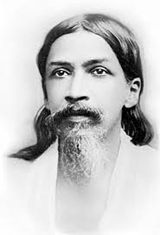Notes on Counselling
Apropos faith
Abstract
Faith cannot be sustained at the level of the mind as reason justifiably challenges every assumption by doubt and as the vital mind that controls emotions can twist reason to erect infallible dogmas. True faith has to be cultivated deep within as a soul quality that eventually passes into knowledge. Faith can be cultivated systematically where one learns not to have faith on one’s ego but in the Truth of one’s being.
Recently a client asked me why, as a doctor, I had no scepticism in accepting the spiritual insight that the universe is not an accident in Time but is pre-ordained and pre-figured in the Creatrix poise of Reality. Hours later he rang me in desperation to ask me why faith is such a fleeting phenomenon that he could not steadily sustain it for an appreciable amount of time.
The technique of holding on to faith is indeed a tricky issue. So many times I have to remind my clients that their prayers can be futile if they immediately begin doubting whether their prayers will be answered. We are never trained to develop faith in the correct way. If we could do so, we would be capable of experientially perceiving the Mother’s famous aphorism in the sphere of illness:
“Finally it is Faith that cures (1).”
There are two important reasons why faith cannot be sustained at the level of the mind:
a. It is the task of reason in its purity to analyse, to classify, to segregate, to break up, to challenge, to debate and it has to bring in the saving faculty of doubt to rise up from bias, prejudice and preferential thinking. Indeed this is the greatest service of reason to humanity. In fact, to progress, reason has to work its way through shifting stances. But this very attribute of reason makes it difficult to construct and sustain faith on its fluctuating surface. Any movement of faith, if solely based on the reasoning mind per se, cannot be justifiably maintained as its integrity will always be challenged by the faculty of doubt.
b. The ordinary functioning of the human mind is not always based on pure reasoning. The human being has a vast emotional repertoire (the vital) and there is a poise of the mind, where emotions preside over the functioning of reason and cognition, and which Sri Aurobindo calls the vital mind. The vital mind can twist the reasoning faculty to erect infallible dogmas and overvalued ideas which seem to be held on to with great conviction masquerading as ‘faith’. Thus is born the religious zealot, the fundamentalist or the idealist who sticks to his own ideas at the cost of others. In extreme cases, the vital mind can have a perverted functioning to produce delusional thinking with unshakeable belief. Faith as a positive psychological attribute cannot be based on dogmas or delusions as they are retrograde to human progress.
The inner faith
Actually, faith has to arise from a base whose flexibility lies not in its fickleness but in its capacity for endless progress and enlargement in consciousness. Such a faith has to be cultivated at first deep inside, in the inner recesses, in the soul-essence. Such a soul-faith is not intellectually conceptualised but experientially perceived as a tangible reality. Even when not consciously cultivated, a trickle of this inner faith flows into outer life which allows the human being to continue to live and dream and aspire despite all the suffering, misery and falsehood ruling the world. Perhaps this ‘instinctive faith’ (2) is one of the greatest boons of the Divine Grace.
Sri Aurobindo explains that the inner faith acts “as an occult light and power from the soul amidst the mind’s ignorance, doubts, weakness, incertitudes. Faith is indispensable to man, for without it he could not proceed forward in his journey through the Unknown; but it ought not to be imposed, it should come as a free perception or an imperative direction from the inner spirit (3).”
Yogis and mystics proceed in this way and enlarge the scope and repertoire of faith at the higher levels of consciousness surpassing the ordinary mind, investing it with vision and intuition. Certainly that is an exceptional movement but serves an exemplary value. Whenever I am confronted with a query in my counselling parleys whether faith is a sign of a weakness in personality, I point out that it is just the reverse as it was with unflinching faith that yogis of yesteryears could go to Manas Sarovar and other intractable regions of the Himalayas in an age when there were no oxygen cylinders and trekking gadgets. The greatest acts of courage rise out of unflinching faith. Faith, if it is to be progressive, has to march with courage and patience (4).
With a progressive growth in consciousness, faith can be turned into “knowledge and perfect experience (5).”
The cultivation of faith
Faith as a psychological attribute needs to be cultivated in a systematic fashion and this training should be initiated in childhood itself. The first requisite is to develop a sound harmony between the mind and the body through a disciplined physical education. Faith cannot blossom in a developing child in a background of disharmony and dis-equilibrium.
The discipline of physical education needs to be supplemented by a thorough programme of nature study. Lord Baden Powell, founder of the Boy Scouts movement, used to stress that the wonders and marvels of nature study would automatically fill the child’s mind with admiration and awe for creation, which is more powerful to instill the sense of faith and gratitude than attending sermons in the church.
As the child grows up, he needs to be encouraged to organise life around an ideal that surpasses the frontal ‘I’, the outer self. Faith, to be developed, must revolve around a higher ideal greater than the outer self. In the absence of an ideal in life, faith fails to develop or develops in a skewed fashion making the individual egoistic and self-centred. The eulogised ideal should reflect the Truth of one’s being in the way most conducive to the individual; it might be a faith in music, in philosophy, in Communism, in humanity, in the Almighty, but whatever it might be, it should be held with unwavering sincerity even amidst the denials of doubt and the turbulences of life.
“Man is given faith in himself, his ideas and his powers that he may work and create and rise to greater things and in the end bring his strength as a worthy offering to the altar of the Spirit (6).” “This faith will be more and more justified as the higher knowledge opens, we shall begin to see the great and small significances that escaped our limited mentality and faith will pass into knowledge. Then we shall see beyond the possibility of doubt that all happens within the working of the one Will and that that will was also wisdom because it develops always the true workings in life of the self and nature (7).”
Thus the universe is finally not an accident in Time but pre-ordained and pre-figured as a supremely creative Supramental Idea for effectuation in reality.
References
1. The Mother. Health and Healing in Yoga. Pondicherry: Sri Aurobindo Ashram Trust; 1979, p. 67.
2. Sri Aurobindo. Birth Centenary Library, Volume 18. Pondicherry: Sri Aurobindo Ashram Trust; 1970, p. 389.
3. Sri Aurobindo. SABCL, Volume 19. 1970, p. 864.
4. Sri Aurobindo. SABCL. Volume20. 1970, p. 41.
5. Sri Aurobindo. SABCL, Volume 18. p. 32.
6. Sri Aurobindo. SABCL, Volume 21. 1970, p. 751.
7. Ibid, p. 753.
Dr. Soumitra Basu, a practising psychiatrist and member of SAIIIHR, is the Director of a school of psychology, Integral Yoga Psychology. He is also one of the editors of NAMAH.
Share with us (Comments,contributions,opinions)
When reproducing this feature, please credit NAMAH,and give the byline. Please send us cuttings.




